Surah Furqan
Contents

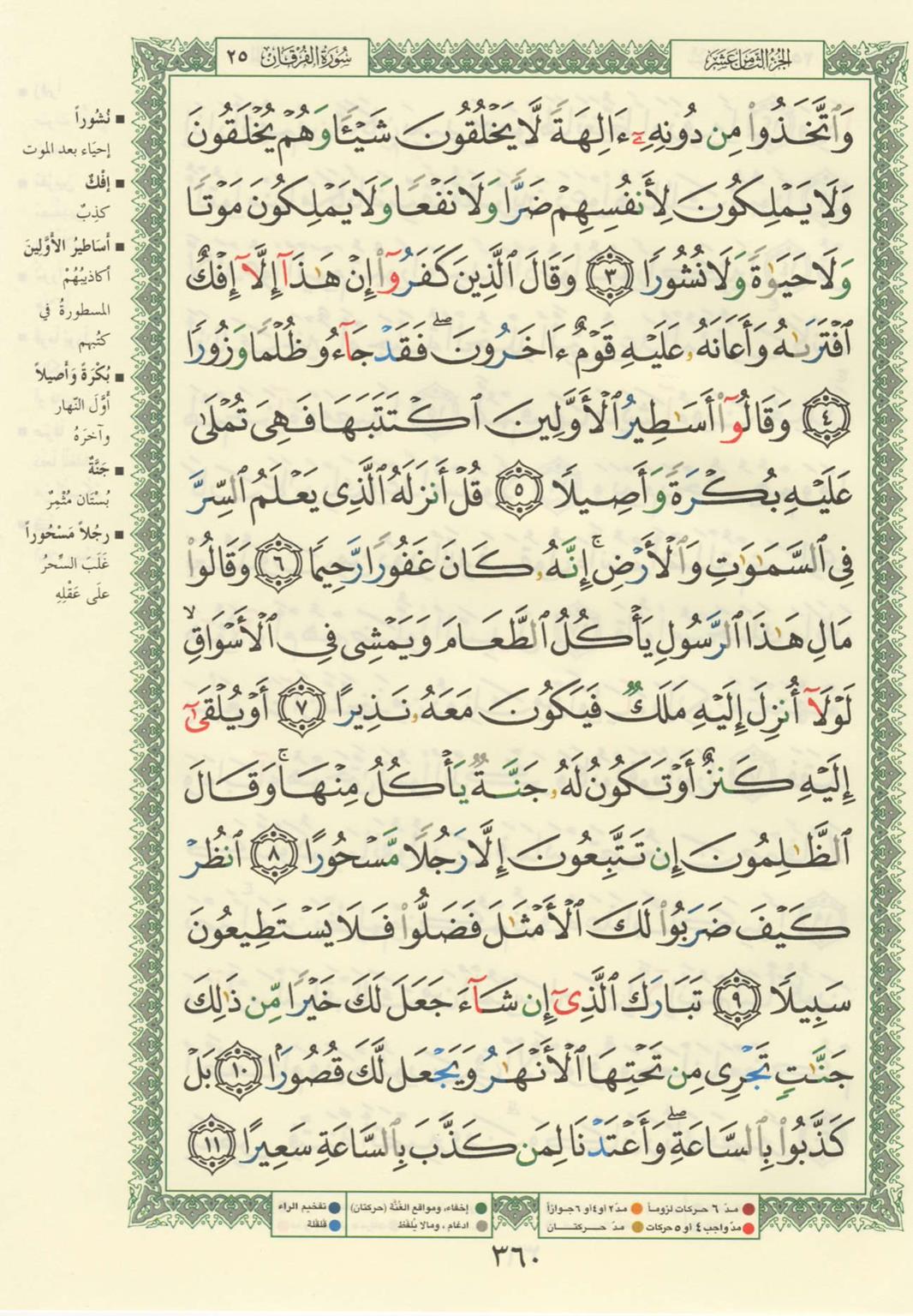
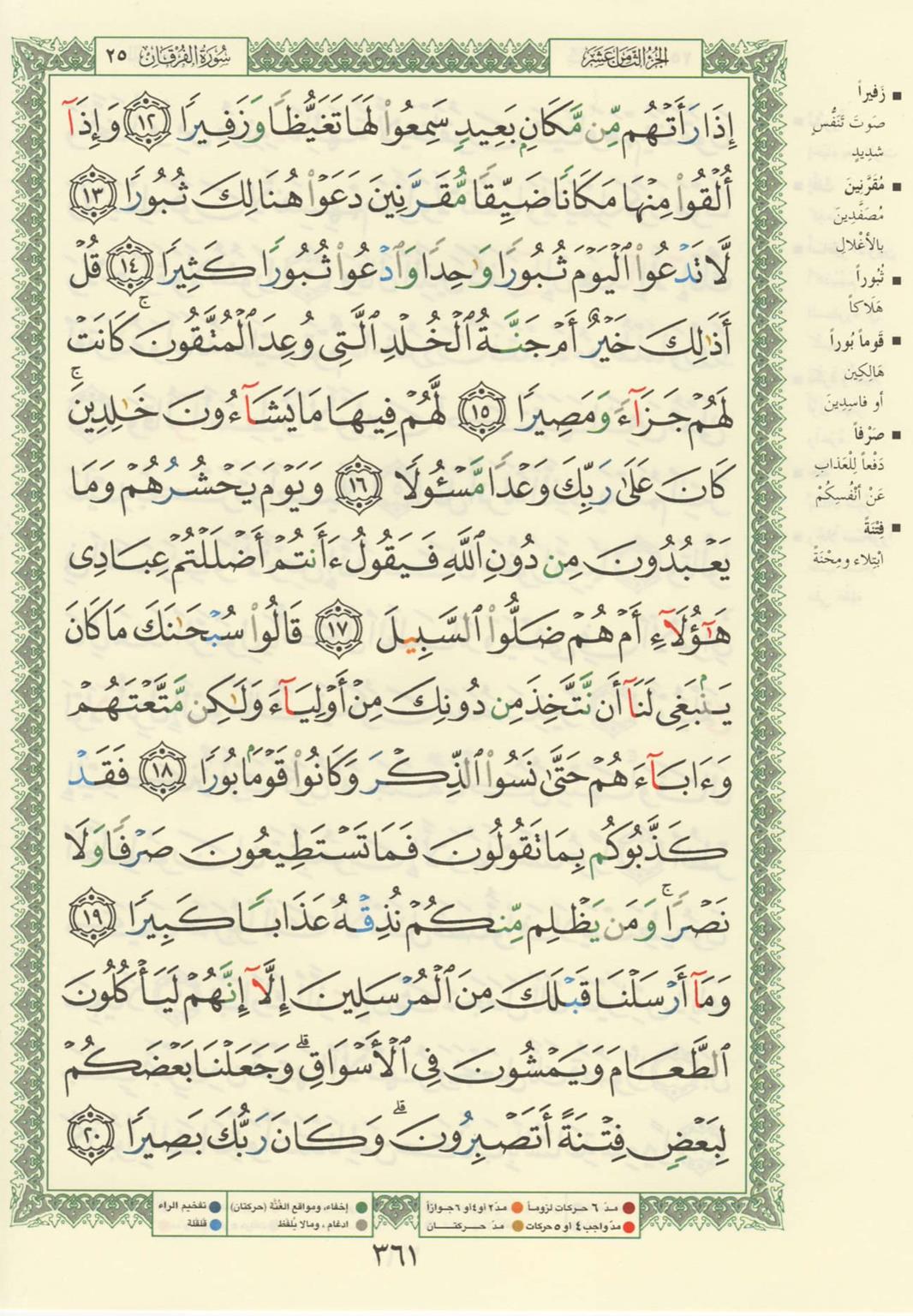
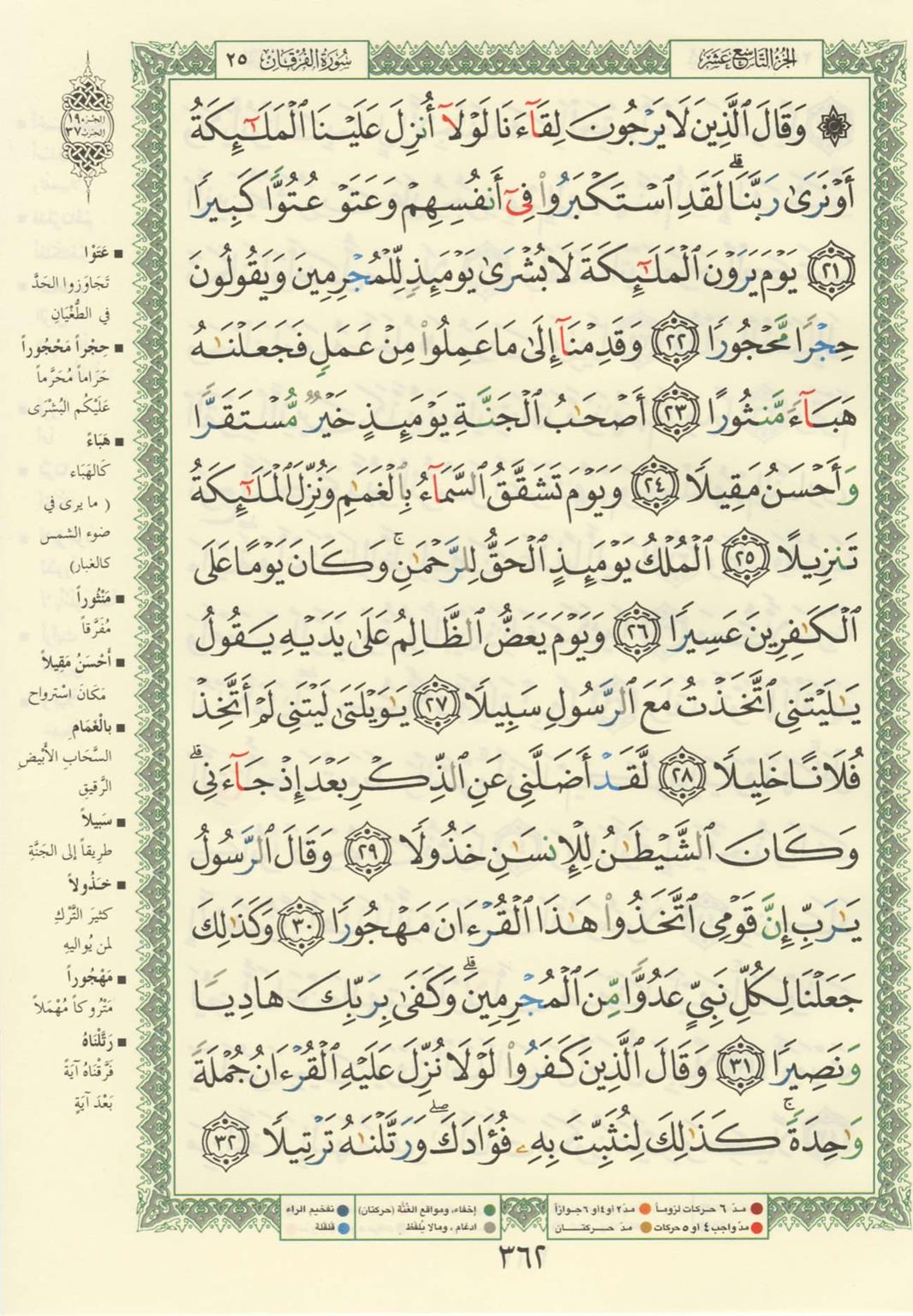
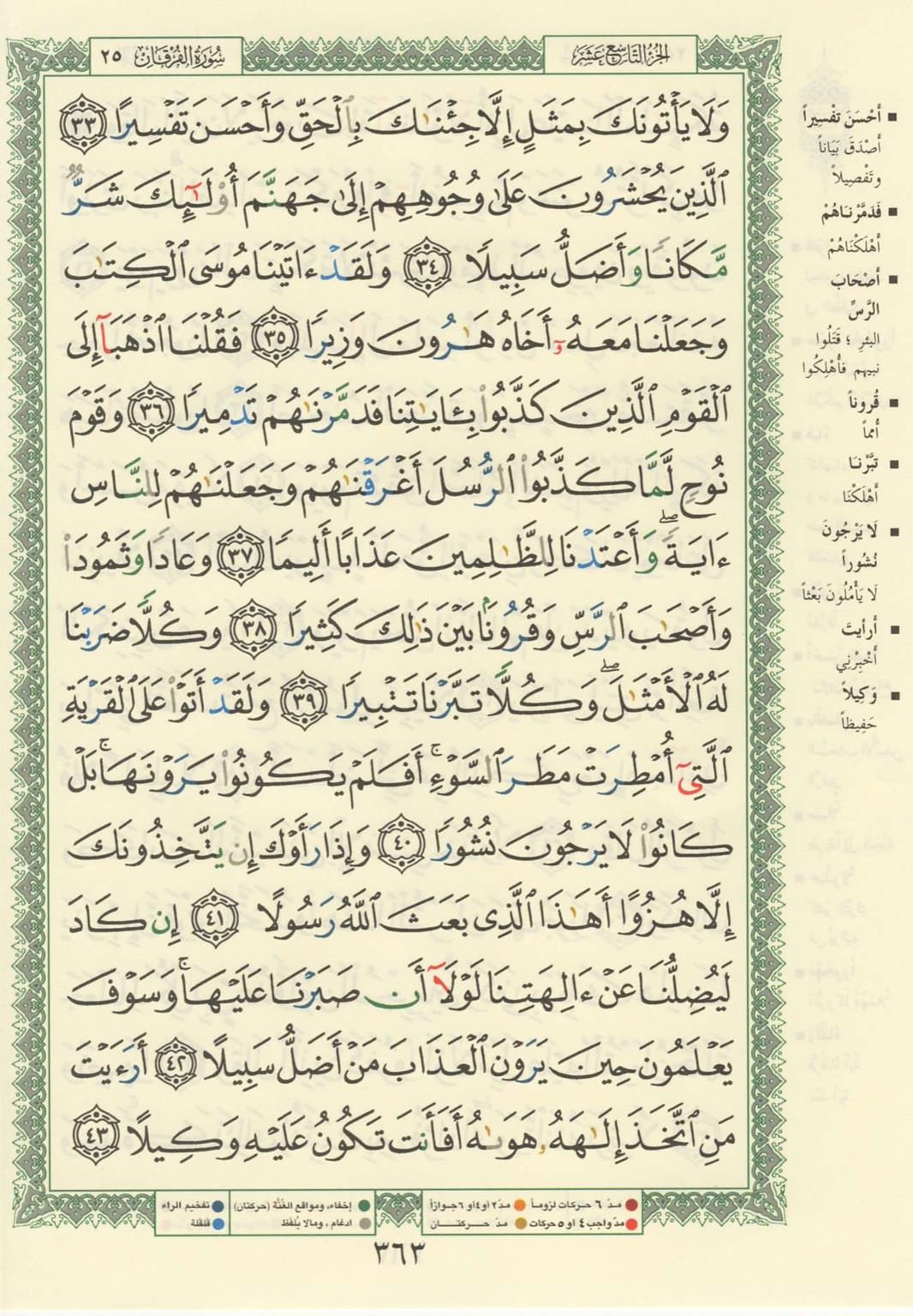
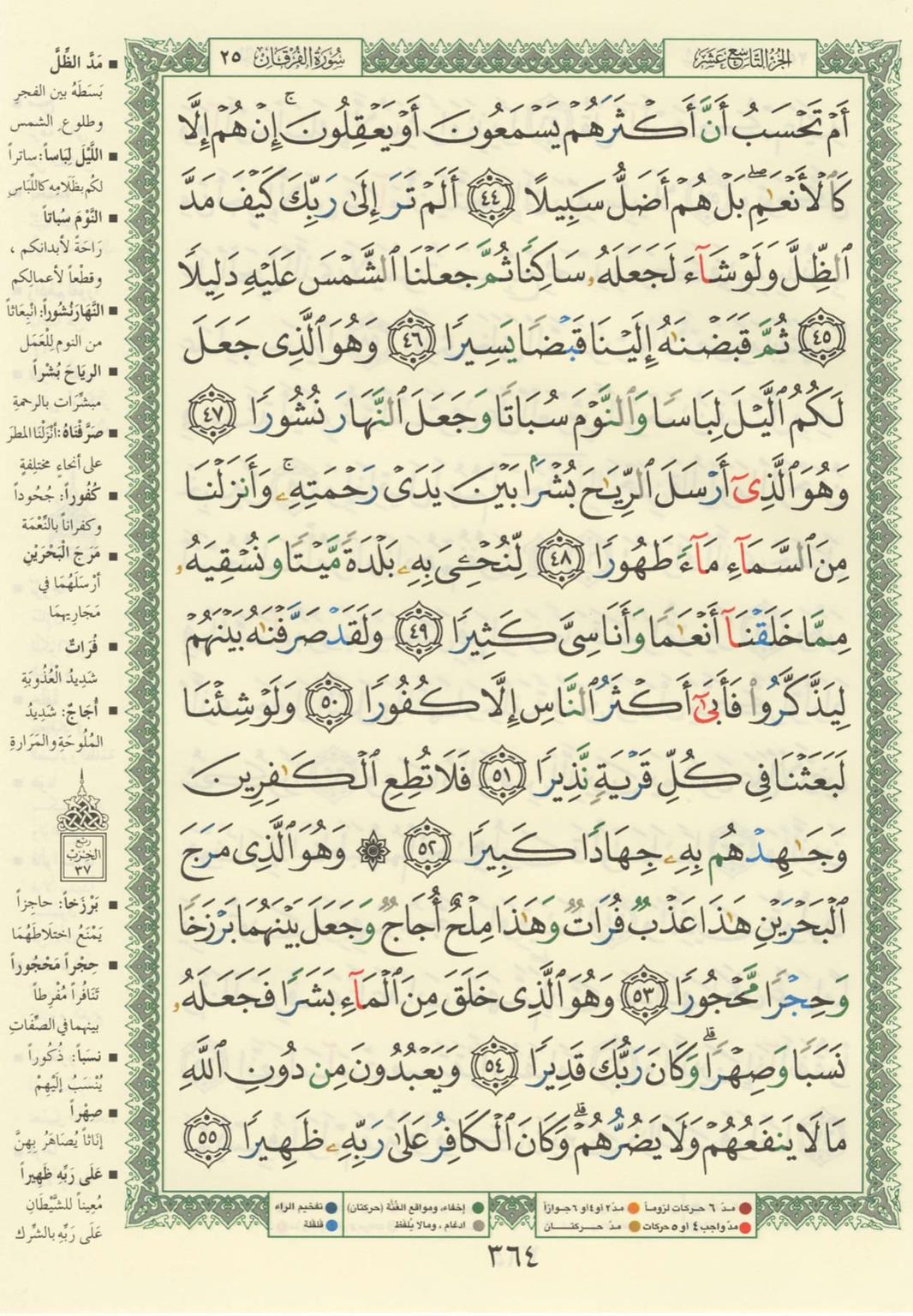
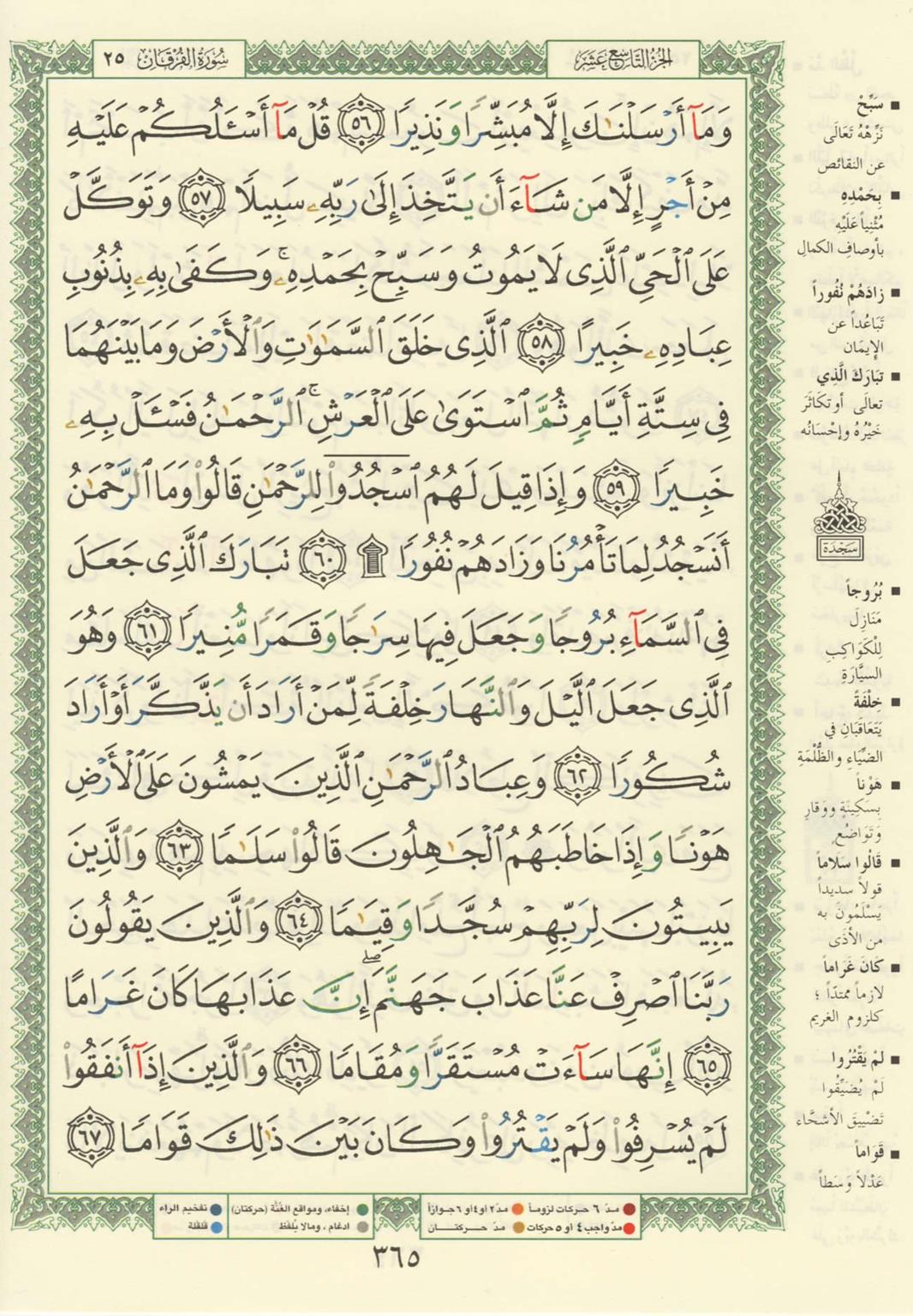
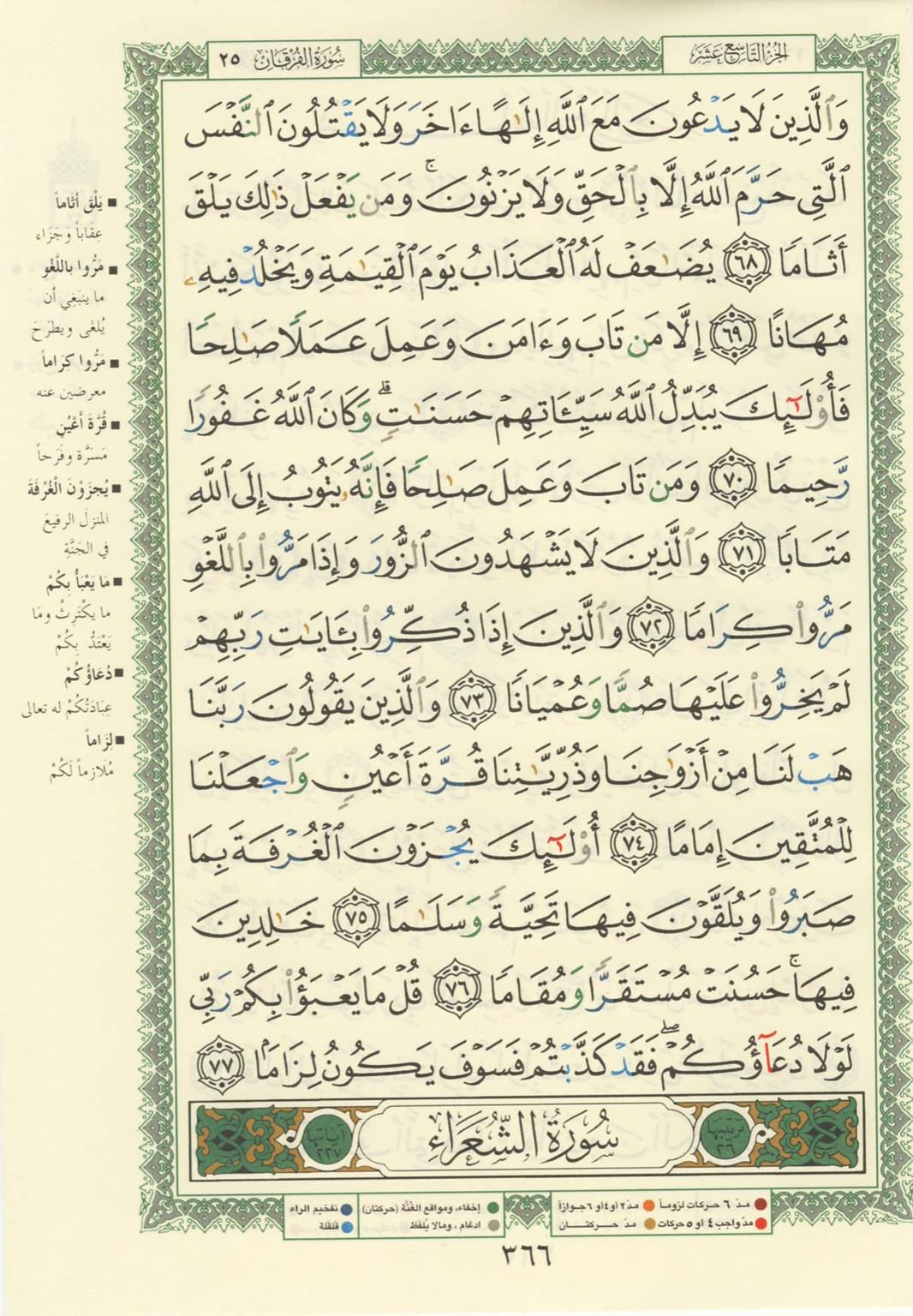
Page 359
25:1
ب-ر-ك
![]() تَبَارَكَ
تَبٰرَكَ
tabāraka
Blessed is He
تَبَارَكَ
تَبٰرَكَ
tabāraka
Blessed is He
ا-ل-ل-ذ
![]() ٱلَّذِي
الَّذِیْ
alladhī
Who
ٱلَّذِي
الَّذِیْ
alladhī
Who
ن-ز-ل
![]() نَزَّلَ
نَزَّلَ
nazzala
sent down
نَزَّلَ
نَزَّلَ
nazzala
sent down
ف-ر-ق
![]() ٱلۡفُرۡقَانَ
الْفُرْقَانَ
l-fur'qāna
the Criterion
ٱلۡفُرۡقَانَ
الْفُرْقَانَ
l-fur'qāna
the Criterion
ع-ل-ي
![]() عَلَىٰ
عَلٰی
ʿalā
upon
عَلَىٰ
عَلٰی
ʿalā
upon
ع-ب-د
![]() عَبۡدِهِۦ
عَبْدِهٖ
ʿabdihi
His slave
عَبۡدِهِۦ
عَبْدِهٖ
ʿabdihi
His slave
ك-و-ن
![]() لِيَكُونَ
لِیَكُوْنَ
liyakūna
that he may be
لِيَكُونَ
لِیَكُوْنَ
liyakūna
that he may be
ع-ل-م
![]() لِلۡعَٰلَمِينَ
لِلْعٰلَمِیْنَ
lil'ʿālamīna
to the worlds
لِلۡعَٰلَمِينَ
لِلْعٰلَمِیْنَ
lil'ʿālamīna
to the worlds
ن-ذ-ر
![]() نَذِيرًا
نَذِیْرَا
nadhīran
a warner -
نَذِيرًا
نَذِیْرَا
nadhīran
a warner -
25:2
ا-ل-ل-ذ
![]() ٱلَّذِي
١لَّذِیْ
alladhī
One Who -
ٱلَّذِي
١لَّذِیْ
alladhī
One Who -
ل
![]() لَهُۥ
لَهٗ
lahu
to Him (belongs)
لَهُۥ
لَهٗ
lahu
to Him (belongs)
م-ل-ك
![]() مُلۡكُ
مُلْكُ
mul'ku
(the) dominion
مُلۡكُ
مُلْكُ
mul'ku
(the) dominion
س-م-و
![]() ٱلسَّمَٰوَٰتِ
السَّمٰوٰتِ
s-samāwāti
(of) the heavens
ٱلسَّمَٰوَٰتِ
السَّمٰوٰتِ
s-samāwāti
(of) the heavens
ا-ر-ض
![]() وَٱلۡأَرۡضِ
وَالْاَرْضِ
wal-arḍi
and the earth,
وَٱلۡأَرۡضِ
وَالْاَرْضِ
wal-arḍi
and the earth,
ل-م
![]() وَلَمۡ
وَلَمْ
walam
and not
وَلَمۡ
وَلَمْ
walam
and not
ا-خ-ذ
![]() يَتَّخِذۡ
یَتَّخِذْ
yattakhidh
He has taken
يَتَّخِذۡ
یَتَّخِذْ
yattakhidh
He has taken
و-ل-د
![]() وَلَدٗا
وَلَدًا
waladan
a son,
وَلَدٗا
وَلَدًا
waladan
a son,
ل-م
![]() وَلَمۡ
وَّلَمْ
walam
and not
وَلَمۡ
وَّلَمْ
walam
and not
ك-و-ن
![]() يَكُن
یَكُنْ
yakun
He has
يَكُن
یَكُنْ
yakun
He has
ل
![]() لَّهُۥ
لَّهٗ
lahu
for Him
لَّهُۥ
لَّهٗ
lahu
for Him
ش-ر-ك
![]() شَرِيكٞ
شَرِیْكٌ
sharīkun
a partner
شَرِيكٞ
شَرِیْكٌ
sharīkun
a partner
ف-ي
![]() فِي
فِی
fī
in
فِي
فِی
fī
in
م-ل-ك
![]() ٱلۡمُلۡكِ
الْمُلْكِ
l-mul'ki
the dominion
ٱلۡمُلۡكِ
الْمُلْكِ
l-mul'ki
the dominion
خ-ل-ق
![]() وَخَلَقَ
وَخَلَقَ
wakhalaqa
and He (has) created
وَخَلَقَ
وَخَلَقَ
wakhalaqa
and He (has) created
ك-ل-ل
![]() كُلَّ
كُلَّ
kulla
every
كُلَّ
كُلَّ
kulla
every
ش-ي-ا
![]() شَيۡءٖ
شَیْءٍ
shayin
thing,
شَيۡءٖ
شَیْءٍ
shayin
thing,
ق-د-ر
![]() فَقَدَّرَهُۥ
فَقَدَّرَهٗ
faqaddarahu
and determined it
فَقَدَّرَهُۥ
فَقَدَّرَهٗ
faqaddarahu
and determined it
ق-د-ر
![]() تَقۡدِيرٗا
تَقْدِیْرًا
taqdīran
(with) determination.
تَقۡدِيرٗا
تَقْدِیْرًا
taqdīran
(with) determination.
25:3
ا-خ-ذ
![]() وَٱتَّخَذُواْ
وَاتَّخَذُوْا
wa-ittakhadhū
Yet they have taken
وَٱتَّخَذُواْ
وَاتَّخَذُوْا
wa-ittakhadhū
Yet they have taken
م-ن
![]() مِن
مِنْ
min
besides Him
مِن
مِنْ
min
besides Him
د-و-ن
![]() دُونِهِۦٓ
دُوْنِهٖۤ
dūnihi
besides Him
دُونِهِۦٓ
دُوْنِهٖۤ
dūnihi
besides Him
ا-ل-ه
![]() ءَالِهَةٗ
اٰلِهَةً
ālihatan
gods
ءَالِهَةٗ
اٰلِهَةً
ālihatan
gods
ل-ا
![]() لَّا
لَّا
lā
not
لَّا
لَّا
lā
not
خ-ل-ق
![]() يَخۡلُقُونَ
یَخْلُقُوْنَ
yakhluqūna
they create
يَخۡلُقُونَ
یَخْلُقُوْنَ
yakhluqūna
they create
ش-ي-ا
![]() شَيۡـٔٗا
شَیْـًٔا
shayan
anything,
شَيۡـٔٗا
شَیْـًٔا
shayan
anything,
ه-م
![]() وَهُمۡ
وَّهُمْ
wahum
while they
وَهُمۡ
وَّهُمْ
wahum
while they
خ-ل-ق
![]() يُخۡلَقُونَ
یُخْلَقُوْنَ
yukh'laqūna
are created,
يُخۡلَقُونَ
یُخْلَقُوْنَ
yukh'laqūna
are created,
ل-ا
![]() وَلَا
وَلَا
walā
and not
وَلَا
وَلَا
walā
and not
م-ل-ك
![]() يَمۡلِكُونَ
یَمْلِكُوْنَ
yamlikūna
they possess
يَمۡلِكُونَ
یَمْلِكُوْنَ
yamlikūna
they possess
ن-ف-س
![]() لِأَنفُسِهِمۡ
لِاَنْفُسِهِمْ
li-anfusihim
for themselves
لِأَنفُسِهِمۡ
لِاَنْفُسِهِمْ
li-anfusihim
for themselves
ض-ر-ر
![]() ضَرّٗا
ضَرًّا
ḍarran
any harm
ضَرّٗا
ضَرًّا
ḍarran
any harm
ل-ا
![]() وَلَا
وَّلَا
walā
and not
وَلَا
وَّلَا
walā
and not
ن-ف-ع
![]() نَفۡعٗا
نَفْعًا
nafʿan
any benefit,
نَفۡعٗا
نَفْعًا
nafʿan
any benefit,
ل-ا
![]() وَلَا
وَّلَا
walā
and not
وَلَا
وَّلَا
walā
and not
م-ل-ك
![]() يَمۡلِكُونَ
یَمْلِكُوْنَ
yamlikūna
they control
يَمۡلِكُونَ
یَمْلِكُوْنَ
yamlikūna
they control
م-و-ت
![]() مَوۡتٗا
مَوْتًا
mawtan
death
مَوۡتٗا
مَوْتًا
mawtan
death
ل-ا
![]() وَلَا
وَّلَا
walā
and not
وَلَا
وَّلَا
walā
and not
ح-ي-ي
![]() حَيَوٰةٗ
حَیٰوةً
ḥayatan
life
حَيَوٰةٗ
حَیٰوةً
ḥayatan
life
ل-ا
![]() وَلَا
وَّلَا
walā
and not
وَلَا
وَّلَا
walā
and not
ن-ش-ر
![]() نُشُورٗا
نُشُوْرًا
nushūran
resurrection.
نُشُورٗا
نُشُوْرًا
nushūran
resurrection.
25:4
ق-و-ل
![]() وَقَالَ
وَقَالَ
waqāla
And say
وَقَالَ
وَقَالَ
waqāla
And say
ا-ل-ل-ذ
![]() ٱلَّذِينَ
الَّذِیْنَ
alladhīna
those who
ٱلَّذِينَ
الَّذِیْنَ
alladhīna
those who
ك-ف-ر
![]() كَفَرُوٓاْ
كَفَرُوْۤا
kafarū
disbelieve,
كَفَرُوٓاْ
كَفَرُوْۤا
kafarū
disbelieve,
ا-ن
![]() إِنۡ
اِنْ
in
"Not
إِنۡ
اِنْ
in
"Not
ه-ا-ذ
![]() هَٰذَآ
هٰذَاۤ
hādhā
this
هَٰذَآ
هٰذَاۤ
hādhā
this
ا-ل-ل-ا
![]() إِلَّآ
اِلَّاۤ
illā
(is) but
إِلَّآ
اِلَّاۤ
illā
(is) but
ا-ف-ك
![]() إِفۡكٌ
اِفْكُ
if'kun
a lie,
إِفۡكٌ
اِفْكُ
if'kun
a lie,
ف-ر-ي
![]() ٱفۡتَرَىٰهُ
١فْتَرٰىهُ
if'tarāhu
he invented it
ٱفۡتَرَىٰهُ
١فْتَرٰىهُ
if'tarāhu
he invented it
ع-و-ن
![]() وَأَعَانَهُۥ
وَاَعَانَهٗ
wa-aʿānahu
and helped him
وَأَعَانَهُۥ
وَاَعَانَهٗ
wa-aʿānahu
and helped him
ع-ل-ي
![]() عَلَيۡهِ
عَلَیْهِ
ʿalayhi
at it
عَلَيۡهِ
عَلَیْهِ
ʿalayhi
at it
ق-و-م
![]() قَوۡمٌ
قَوْمٌ
qawmun
people
قَوۡمٌ
قَوْمٌ
qawmun
people
ا-خ-ر
![]() ءَاخَرُونَۖ
اٰخَرُوْنَ ۛۚ—
ākharūna
other."
ءَاخَرُونَۖ
اٰخَرُوْنَ ۛۚ—
ākharūna
other."
ق-د
![]() فَقَدۡ
فَقَدْ
faqad
But verily,
فَقَدۡ
فَقَدْ
faqad
But verily,
ج-ي-ا
![]() جَآءُو
جَآءُوْ
jāū
they (have) produced
جَآءُو
جَآءُوْ
jāū
they (have) produced
ظ-ل-م
![]() ظُلۡمٗا
ظُلْمًا
ẓul'man
an injustice
ظُلۡمٗا
ظُلْمًا
ẓul'man
an injustice
ز-و-ر
![]() وَزُورٗا
وَّزُوْرًا
wazūran
and a lie.
وَزُورٗا
وَّزُوْرًا
wazūran
and a lie.
25:5
ق-و-ل
![]() وَقَالُوٓاْ
وَقَالُوْۤا
waqālū
And they say,
وَقَالُوٓاْ
وَقَالُوْۤا
waqālū
And they say,
س-ط-ر
![]() أَسَٰطِيرُ
اَسَاطِیْرُ
asāṭīru
"Tales
أَسَٰطِيرُ
اَسَاطِیْرُ
asāṭīru
"Tales
ا-و-ل
![]() ٱلۡأَوَّلِينَ
الْاَوَّلِیْنَ
l-awalīna
(of) the former people
ٱلۡأَوَّلِينَ
الْاَوَّلِیْنَ
l-awalīna
(of) the former people
ك-ت-ب
![]() ٱكۡتَتَبَهَا
اكْتَتَبَهَا
ik'tatabahā
which he has had written
ٱكۡتَتَبَهَا
اكْتَتَبَهَا
ik'tatabahā
which he has had written
ه-ي
![]() فَهِيَ
فَهِیَ
fahiya
and they
فَهِيَ
فَهِیَ
fahiya
and they
م-ل-و
![]() تُمۡلَىٰ
تُمْلٰی
tum'lā
are dictated
تُمۡلَىٰ
تُمْلٰی
tum'lā
are dictated
ع-ل-ي
![]() عَلَيۡهِ
عَلَیْهِ
ʿalayhi
to him
عَلَيۡهِ
عَلَیْهِ
ʿalayhi
to him
ب-ك-ر
![]() بُكۡرَةٗ
بُكْرَةً
buk'ratan
morning
بُكۡرَةٗ
بُكْرَةً
buk'ratan
morning
ا-ص-ل
![]() وَأَصِيلٗا
وَّاَصِیْلًا
wa-aṣīlan
and evening."
وَأَصِيلٗا
وَّاَصِیْلًا
wa-aṣīlan
and evening."
25:6
ق-و-ل
![]() قُلۡ
قُلْ
qul
Say,
قُلۡ
قُلْ
qul
Say,
ن-ز-ل
![]() أَنزَلَهُ
اَنْزَلَهُ
anzalahu
"Has sent it down
أَنزَلَهُ
اَنْزَلَهُ
anzalahu
"Has sent it down
ا-ل-ل-ذ
![]() ٱلَّذِي
الَّذِیْ
alladhī
the One Who
ٱلَّذِي
الَّذِیْ
alladhī
the One Who
ع-ل-م
![]() يَعۡلَمُ
یَعْلَمُ
yaʿlamu
knows
يَعۡلَمُ
یَعْلَمُ
yaʿlamu
knows
س-ر-ر
![]() ٱلسِّرَّ
السِّرَّ
s-sira
the secret
ٱلسِّرَّ
السِّرَّ
s-sira
the secret
ف-ي
![]() فِي
فِی
fī
in
فِي
فِی
fī
in
س-م-و
![]() ٱلسَّمَٰوَٰتِ
السَّمٰوٰتِ
s-samāwāti
the heavens
ٱلسَّمَٰوَٰتِ
السَّمٰوٰتِ
s-samāwāti
the heavens
ا-ر-ض
![]() وَٱلۡأَرۡضِۚ
وَالْاَرْضِ ؕ—
wal-arḍi
and the earth.
وَٱلۡأَرۡضِۚ
وَالْاَرْضِ ؕ—
wal-arḍi
and the earth.
ا-ن-ن
![]() إِنَّهُۥ
اِنَّهٗ
innahu
Indeed, He
إِنَّهُۥ
اِنَّهٗ
innahu
Indeed, He
ك-و-ن
![]() كَانَ
كَانَ
kāna
is
كَانَ
كَانَ
kāna
is
غ-ف-ر
![]() غَفُورٗا
غَفُوْرًا
ghafūran
Oft-Forgiving,
غَفُورٗا
غَفُوْرًا
ghafūran
Oft-Forgiving,
ر-ح-م
![]() رَّحِيمٗا
رَّحِیْمًا
raḥīman
Most Merciful."
رَّحِيمٗا
رَّحِیْمًا
raḥīman
Most Merciful."
25:7
ق-و-ل
![]() وَقَالُواْ
وَقَالُوْا
waqālū
And they say,
وَقَالُواْ
وَقَالُوْا
waqālū
And they say,
م-ا-ل
![]() مَالِ
مَالِ
māli
"Why does
مَالِ
مَالِ
māli
"Why does
ه-ا-ذ
![]() هَٰذَا
هٰذَا
hādhā
this
هَٰذَا
هٰذَا
hādhā
this
ر-س-ل
![]() ٱلرَّسُولِ
الرَّسُوْلِ
r-rasūli
Messenger
ٱلرَّسُولِ
الرَّسُوْلِ
r-rasūli
Messenger
ا-ك-ل
![]() يَأۡكُلُ
یَاْكُلُ
yakulu
eat
يَأۡكُلُ
یَاْكُلُ
yakulu
eat
ط-ع-م
![]() ٱلطَّعَامَ
الطَّعَامَ
ṭ-ṭaʿāma
[the] food
ٱلطَّعَامَ
الطَّعَامَ
ṭ-ṭaʿāma
[the] food
م-ش-ي
![]() وَيَمۡشِي
وَیَمْشِیْ
wayamshī
and walk
وَيَمۡشِي
وَیَمْشِیْ
wayamshī
and walk
ف-ي
![]() فِي
فِی
fī
in
فِي
فِی
fī
in
س-و-ق
![]() ٱلۡأَسۡوَاقِ
الْاَسْوَاقِ ؕ—
l-aswāqi
the markets?
ٱلۡأَسۡوَاقِ
الْاَسْوَاقِ ؕ—
l-aswāqi
the markets?
ل-و-ل-ا
![]() لَوۡلَآ
لَوْلَاۤ
lawlā
Why not
لَوۡلَآ
لَوْلَاۤ
lawlā
Why not
ن-ز-ل
![]() أُنزِلَ
اُنْزِلَ
unzila
is sent down
أُنزِلَ
اُنْزِلَ
unzila
is sent down
ا-ل-ي
![]() إِلَيۡهِ
اِلَیْهِ
ilayhi
to him
إِلَيۡهِ
اِلَیْهِ
ilayhi
to him
م-ل-ك
![]() مَلَكٞ
مَلَكٌ
malakun
an Angel
مَلَكٞ
مَلَكٌ
malakun
an Angel
ك-و-ن
![]() فَيَكُونَ
فَیَكُوْنَ
fayakūna
then he be
فَيَكُونَ
فَیَكُوْنَ
fayakūna
then he be
م-ع
![]() مَعَهُۥ
مَعَهٗ
maʿahu
with him
مَعَهُۥ
مَعَهٗ
maʿahu
with him
ن-ذ-ر
![]() نَذِيرًا
نَذِیْرًا
nadhīran
a warner?
نَذِيرًا
نَذِیْرًا
nadhīran
a warner?
25:8
ا-و
![]() أَوۡ
اَوْ
aw
Or
أَوۡ
اَوْ
aw
Or
ل-ق-ي
![]() يُلۡقَىٰٓ
یُلْقٰۤی
yul'qā
is delivered
يُلۡقَىٰٓ
یُلْقٰۤی
yul'qā
is delivered
ا-ل-ي
![]() إِلَيۡهِ
اِلَیْهِ
ilayhi
to him
إِلَيۡهِ
اِلَیْهِ
ilayhi
to him
ك-ن-ز
![]() كَنزٌ
كَنْزٌ
kanzun
a treasure
كَنزٌ
كَنْزٌ
kanzun
a treasure
ا-و
![]() أَوۡ
اَوْ
aw
or
أَوۡ
اَوْ
aw
or
ك-و-ن
![]() تَكُونُ
تَكُوْنُ
takūnu
is
تَكُونُ
تَكُوْنُ
takūnu
is
ل
![]() لَهُۥ
لَهٗ
lahu
for him
لَهُۥ
لَهٗ
lahu
for him
ج-ن-ن
![]() جَنَّةٞ
جَنَّةٌ
jannatun
a garden,
جَنَّةٞ
جَنَّةٌ
jannatun
a garden,
ا-ك-ل
![]() يَأۡكُلُ
یَّاْكُلُ
yakulu
he may eat
يَأۡكُلُ
یَّاْكُلُ
yakulu
he may eat
م-ن
![]() مِنۡهَاۚ
مِنْهَا ؕ—
min'hā
from
مِنۡهَاۚ
مِنْهَا ؕ—
min'hā
from
ق-و-ل
![]() وَقَالَ
وَقَالَ
waqāla
And say
وَقَالَ
وَقَالَ
waqāla
And say
ظ-ل-م
![]() ٱلظَّٰلِمُونَ
الظّٰلِمُوْنَ
ẓ-ẓālimūna
the wrongdoers,
ٱلظَّٰلِمُونَ
الظّٰلِمُوْنَ
ẓ-ẓālimūna
the wrongdoers,
ا-ن
![]() إِن
اِنْ
in
"Not
إِن
اِنْ
in
"Not
ت-ب-ع
![]() تَتَّبِعُونَ
تَتَّبِعُوْنَ
tattabiʿūna
you follow
تَتَّبِعُونَ
تَتَّبِعُوْنَ
tattabiʿūna
you follow
ا-ل-ل-ا
![]() إِلَّا
اِلَّا
illā
but
إِلَّا
اِلَّا
illā
but
ر-ج-ل
![]() رَجُلٗا
رَجُلًا
rajulan
a man
رَجُلٗا
رَجُلًا
rajulan
a man
س-ح-ر
![]() مَّسۡحُورًا
مَّسْحُوْرًا
masḥūran
bewitched."
مَّسۡحُورًا
مَّسْحُوْرًا
masḥūran
bewitched."
25:9
ن-ظ-ر
![]() ٱنظُرۡ
اُنْظُرْ
unẓur
See
ٱنظُرۡ
اُنْظُرْ
unẓur
See
ك-ي-ف
![]() كَيۡفَ
كَیْفَ
kayfa
how
كَيۡفَ
كَیْفَ
kayfa
how
ض-ر-ب
![]() ضَرَبُواْ
ضَرَبُوْا
ḍarabū
they set forth
ضَرَبُواْ
ضَرَبُوْا
ḍarabū
they set forth
ل
![]() لَكَ
لَكَ
laka
for you
لَكَ
لَكَ
laka
for you
م-ث-ل
![]() ٱلۡأَمۡثَٰلَ
الْاَمْثَالَ
l-amthāla
the similitudes,
ٱلۡأَمۡثَٰلَ
الْاَمْثَالَ
l-amthāla
the similitudes,
ض-ل-ل
![]() فَضَلُّواْ
فَضَلُّوْا
faḍallū
but they have gone astray,
فَضَلُّواْ
فَضَلُّوْا
faḍallū
but they have gone astray,
ل-ا
![]() فَلَا
فَلَا
falā
so not
فَلَا
فَلَا
falā
so not
ط-و-ع
![]() يَسۡتَطِيعُونَ
یَسْتَطِیْعُوْنَ
yastaṭīʿūna
they are able (to find)
يَسۡتَطِيعُونَ
یَسْتَطِیْعُوْنَ
yastaṭīʿūna
they are able (to find)
س-ب-ل
![]() سَبِيلٗا
سَبِیْلًا
sabīlan
a way.
سَبِيلٗا
سَبِیْلًا
sabīlan
a way.
25:10
ب-ر-ك
![]() تَبَارَكَ
تَبٰرَكَ
tabāraka
Blessed is He
تَبَارَكَ
تَبٰرَكَ
tabāraka
Blessed is He
ا-ل-ل-ذ
![]() ٱلَّذِيٓ
الَّذِیْۤ
alladhī
Who
ٱلَّذِيٓ
الَّذِیْۤ
alladhī
Who
ا-ن
![]() إِن
اِنْ
in
if
إِن
اِنْ
in
if
ش-ي-ا
![]() شَآءَ
شَآءَ
shāa
He willed
شَآءَ
شَآءَ
shāa
He willed
ج-ع-ل
![]() جَعَلَ
جَعَلَ
jaʿala
(could have) made
جَعَلَ
جَعَلَ
jaʿala
(could have) made
ل
![]() لَكَ
لَكَ
laka
for you
لَكَ
لَكَ
laka
for you
خ-ي-ر
![]() خَيۡرٗا
خَیْرًا
khayran
better
خَيۡرٗا
خَیْرًا
khayran
better
م-ن
![]() مِّن
مِّنْ
min
than
مِّن
مِّنْ
min
than
ذ-ل-ك
![]() ذَٰلِكَ
ذٰلِكَ
dhālika
that -
ذَٰلِكَ
ذٰلِكَ
dhālika
that -
ج-ن-ن
![]() جَنَّٰتٖ
جَنّٰتٍ
jannātin
gardens -
جَنَّٰتٖ
جَنّٰتٍ
jannātin
gardens -
ج-ر-ي
![]() تَجۡرِي
تَجْرِیْ
tajrī
flow
تَجۡرِي
تَجْرِیْ
tajrī
flow
م-ن
![]() مِن
مِنْ
min
from
مِن
مِنْ
min
from
ت-ح-ت
![]() تَحۡتِهَا
تَحْتِهَا
taḥtihā
underneath it
تَحۡتِهَا
تَحْتِهَا
taḥtihā
underneath it
ن-ه-ر
![]() ٱلۡأَنۡهَٰرُ
الْاَنْهٰرُ ۙ—
l-anhāru
the rivers
ٱلۡأَنۡهَٰرُ
الْاَنْهٰرُ ۙ—
l-anhāru
the rivers
ج-ع-ل
![]() وَيَجۡعَل
وَیَجْعَلْ
wayajʿal
and He (could) make
وَيَجۡعَل
وَیَجْعَلْ
wayajʿal
and He (could) make
ل
![]() لَّكَ
لَّكَ
laka
for you
لَّكَ
لَّكَ
laka
for you
ق-ص-ر
![]() قُصُورَۢا
قُصُوْرًا
quṣūran
palaces.
قُصُورَۢا
قُصُوْرًا
quṣūran
palaces.

